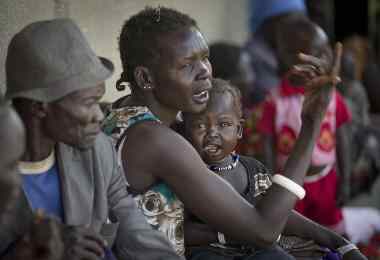South Sudan’s Jonglei state pushes for better health services – officials
May 9, 2015 (BOR) – The ministry of health in Jonglei state, Ngok Kuol, said his institution was working hard to improve health situation among populations in the South Sudan’s largest state.

“Health status of the remote population was bad during the crisis, but now the government has improved health services in the areas under the government,” said minister Angok.
The official said his government could not assess health situation in the areas they lost control to the rebels, but added that they were however receiving reports from other health agencies operating in the opposition-held territories.
“At the other side [rebel controlled areas] we cannot of course supervise as the government but we trust our partners who are on the other side, through the report they are giving us, we believe that the reports they are giving us are accurate reports,” he said.
Currently, South Sudanese rebels control some of Jonglei state’s remote territories including Akobo county which borders Gambella region of Ethiopia.
The government’s Friday quarterly meeting, the ninth quarter, since Rapid Result Health project, funded by the World Bank via ministry of health, reviewed medical services delivery as implemented by the Inter-church Medical Association (IMA), World Health and its subcontractors (partners) in the state.
The minister said the war imposed negative impacts on the innocent people who had no hands in the current political crisis in the country.
“The population, majority of the people who had no hand in whatever is happening deserved to be given services,” he said.
He revealed that government continued to reach the rebel-controlled areas in order to provide services through non-governmental groups.
“We have not stopped giving health services to the people in the rebel held areas, since the crisis started, whether drugs, facilities and equipment, we have allowed personnel, any other South Sudanese or international staff who feel save to work in those areas. We don’t stop them,” he added.
IMA world health chief of party, Dr. Mounir Lado, also said his organisation and the partners they contracted had been working hard to improve services delivery in Jonglei state.
He revealed that IMA had faced shortage of health facilities with which they operate, with a decrease from 24 primary health care centres or units to 19 after the crisis in Jonglei state.
“Efforts to restore the health centres or units destroyed during the crisis were under way,” he said.
Jonglei state appeared in the third position in the country in 2013 before the crisis in terms of improvement of health services delivery, but many health facilities have been destroyed after eruption of the civil war in December 2013.
The meeting however resolved to scale up health response to the population as the rainy season, which is normally associated with increase in malaria and kalazar cases, among others, approaches.
(ST)
